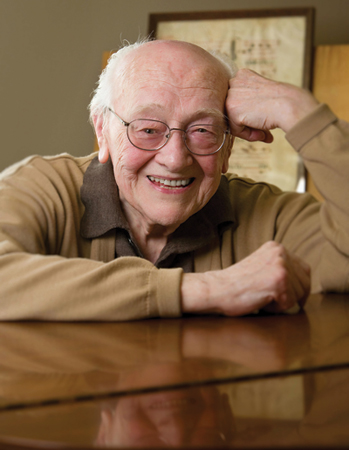Had things been different in Czechoslovakia in 1939, Apex resident Karel Husa might have become an engineer, depriving the world of a musical genius of the 20th century. Husa was studying to become an engineer in Prague when Hitler’s troops invaded. Universities were shut down, and it appeared that Husa would join many of his classmates as a worker in the munitions factories. But life had a separate path for Husa. Instead, he enrolled in a music conservatory. It was a decision that changed the course of his life. His knowledge of violin and piano, and his natural talent for unique composition earned Husa a spot as one of the notable composers of the century, and the 1969 Pulitzer Prize for music.
In 1968, he sat in his home in Ithaca, N.Y., and listened to the Soviet invasion of his home country, the Czech Republic, on a transistor radio. “I couldn’t believe these two friends, the Soviet Union and Czechoslovakia, would attack each other,” he recalled. “I remember the 1939 occupation by Hitler when I was 18. I knew what freedom was and why people fight for that.”
Those memories and that surge of emotion is what compelled Husa to write what is likely his most well-known piece of music — Music for Prague 1968.
`
“I use music as a manifesto for something that I believe about a small country that would like to have freedom, but never did,” he said.
At that time, Husa had been commissioned by Ithaca College to write a piece of music. For seven weeks, he wrote in what he describes as a turbulent manner. The end result was a piece of music that would garner more listeners than his Pulitzer Prize-winning String Quartet No. 3, and a piece of music that would become an anthem, of sorts, for freedom.
When Husa received the Pulitzer Prize in 1969 for String Quartet No. 3, it was an unexpected recognition. “You hope that your music will be recognized. That’s why you’re writing it. But I certainly didn’t expect it,” he said.
He had written three previous quartets, though the first had been abandoned, but it was String Quartet No. 3 where he decided to take some chances.
“I like to put in mostly technical things, but I also tried other elements that were not used in the previous quartets,” he said. “It was unusual writing and I think the jury liked that it was something new.”
Husa studied the violin when he was only 7 years old, and having learned from the violin how to write for strings, he knew there were new paths that he wanted to explore. “I wanted to do something new and interesting, even if I couldn’t do it myself,” he said.
Husa’s music is known for being modern, unique and complex. “I know I can write anything within the laws of music and they will play it. For any instrument or ensemble, you have complete freedom,” he said.
Each of Husa’s works holds a special importance to him. He views them as he does his children, and picking a favorite is impossible. “I have four children,” he said, “and I love them all equally.”
Outside of the music community, the Pulitzer Prize is Husa’s most notable award. He also received the Grawemeyer Award from the University of Louisville for music composition in 1993 for Concerto for Cello and Orchestra, and the 1950 Lili Boulanger Award and 1952 Bilthoven Festival Prize for his First String Quartet.
“Winning the Pulitzer,” he said, “maybe meant that composers meant something, too.”
Husa approaches composing music as he said a writer would approach writing a novel. “Writers deal with words, and I deal with notes, but it’s the exact same methods to choose what I need to convey my message,” he said.
“If I need slow and sad music, then I use the notes that way. In composing, I can bring myself into excitement when the music is happy, but I can also use the notes to create despair and tragedy,” he said. “You may be in front of this music paper with five lines, wondering what to say. There are certain times and events that make you realize that writing music is this esoteric thing. You can express whatever you want in sounds.”
And like many great writers, Husa is influenced by everything around him — events, places, people and nature. “We are a part of nature, and it has an impact on all of us,” Husa said. He is inspired by the works of other great naturalists like Walt Whitman and Henry David Thoreau. In Husa’s music, each instrument and each note illustrates a small portion of the total story.
Today, Husa lives an unassuming life in Apex. Retired from his years as a professor at Cornell University and Ithaca College, having put away his conductor’s baton, he is still a composer. A book of music paper with those five lines sits on the desk of his home office waiting for his next notes of inspiration. And around the world, his music is still played, and it still excites him to hear it.
“There is something extraordinary that happens when you come to the end of a performance and people suddenly get excited,” he said. “It means something to me.”






